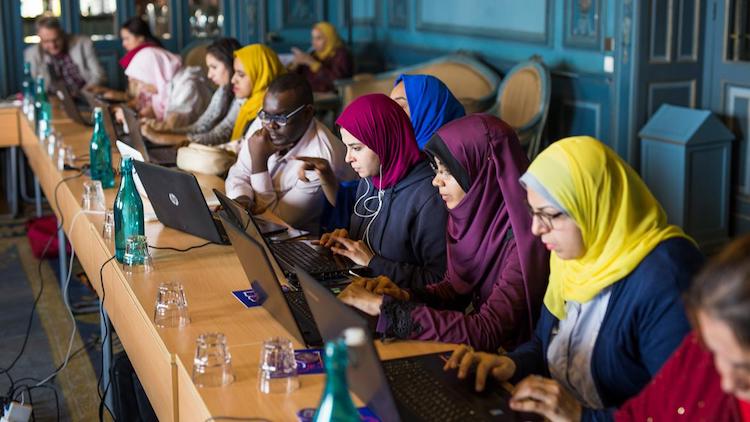By Caroline Mwanga
NEW YORK (IDN) — Though largely excluded from formal mediation roles, women across conflict-affected countries in the Arab region have been instrumental in diffusing tensions and mediating conflicts in their own communities.
UN Women’s new report, “Women’s Participation in Local Mediation: Lessons from Iraq, Libya, Syria, Yemen”, highlights the diverse mediation roles women have played to resolve conflict and restore social cohesion in their communities.
The report illuminates the numerous and diverse ways that women mediate local conflicts across the Middle East and North Africa region. Drawing on case studies from Iraq, Libya, Syria and Yemen, it maps entry points, techniques and outcomes of women’s local mediation efforts. It asks: What type of conflicts do women usually mediate? Who are the mediators? How have women mediators negotiated local conflicts?
It also discusses key themes: the relationship between local mediation and national peace processes; the role of social norms; what happens outside of negotiations; and the impact of digitalization on local mediation. In doing so, the report aims to better support the role of women in mediation and thereby strengthen prospects for peace.
Key findings of the study include the following:
Women operate as “insider mediators”: Women mediators in Iraq, Libya, Syria and Yemen held diverse profiles. Unlike male mediators, who could more often rely on their formal status (such as tribal leader or local authority) to mediate disputes, most women mediators operated as insider mediators, meaning they had some type of connection to the dispute and were trusted and perceived as credible by the disputing parties. Women demonstrated two consistent traits as insider mediators: their ability to build or leverage relationships; and detailed knowledge of the conflict and conflict parties.
Women mediators negotiate a wide range of local conflicts: This included matters concerning security and conflict (such as ceasefires, war-time violations and inter-tribal disputes); displacement and return of internally displaced persons; and personal or family issues (such as conflict over land, divorce and gender-based violence).
The UN report points out that women mediators play diverse roles in mediation: Sometimes women engaged in mediation as the negotiator, and sometimes they act in less visible roles by initiating dialogue, bringing parties to the table or rebuilding relationships.
Across the four countries, conflict often changed socially ascribed gender roles and enabled women to take a more visible role in local mediation, particularly in certain locations where men face movement restrictions and risk of arrest. Women were often required to navigate complex social norms and political sensitivities in order to take on this role.
Women mediators navigate a wide range of risks to their well-being: They yoften experienced harassment and intimidation, as well as strict social control. In order to mitigate these risks, women built partnerships with strategic male allies (such as tribal leaders or police), strengthened community trust in their role as mediator, and worked within gendered social norms while drawing attention to the history of women’s involvement in conflict resolution.
Women mediators reject the overuse of “tradition” or “social norms” as a means of limiting their agency: While gendered social norms do shape and restrict women’s involvement in mediation, the sweeping blame placed on tradition or social norms often distorts the nuances present in each culture and ignores the historical contributions women have made to peace.
Women help to connect the different “tracks” of peace processes, but more remains to be done: Women’s local mediation efforts have addressed issues that the Track I processes could not, such as the release of political detainees and prisoners of war; and women mediators have raised issues drawn from their own local mediation experiences at the Track I negotiation table, such as transitional justice and accountability for human rights violations.
Despite these achievements, local women mediators consistently perceived Track I actors as fiated on narrow security issues while giving insufficient attention to the daily issues communities face. They also pointed to a lack of financial and logistical resources to enable them to access Track I and II processes.
Women mediators benefit from technology, but also need tailored online protection, says the report. Technology has expanded women’s access to higher-level spaces and has strengthened networks among women mediators in the same country, on different “sides”, and across different countries.
At the same time, technology removes the in-person opportunity to build personal relationships and advance advocacy goals and may contribute to decision makers not taking meetings seriously. While technology presents significant opportunities, it also creates new risks and can have unintended consequences for women. It is possible—and vital—to mitigate the risks that women face in online spaces and ensure that their safety and rights are protected without limiting their access to online spaces.
The report concludes with recommendations to strengthen the efforts of local women mediators. Five strategic areas for support are identified: (1) strengthening networks and knowledge sharing; (2) providing resources that enable inclusion of a diverse range of women; (3) improving protection for women mediators; (4) encouraging local ownership and context-specific support; and (5) continuing to raise public awareness through advocacy and research. [IDN-InDepthNews – 22 October 2022]
Photo credit: UN Women/Emad Karim
IDN is the flagship agency of the Non-profit International Press Syndicate.
We believe in the free flow of information. Republish our articles for free, online or in print, under Creative Commons Attribution 4.0 International, except for articles that are republished with permission.

